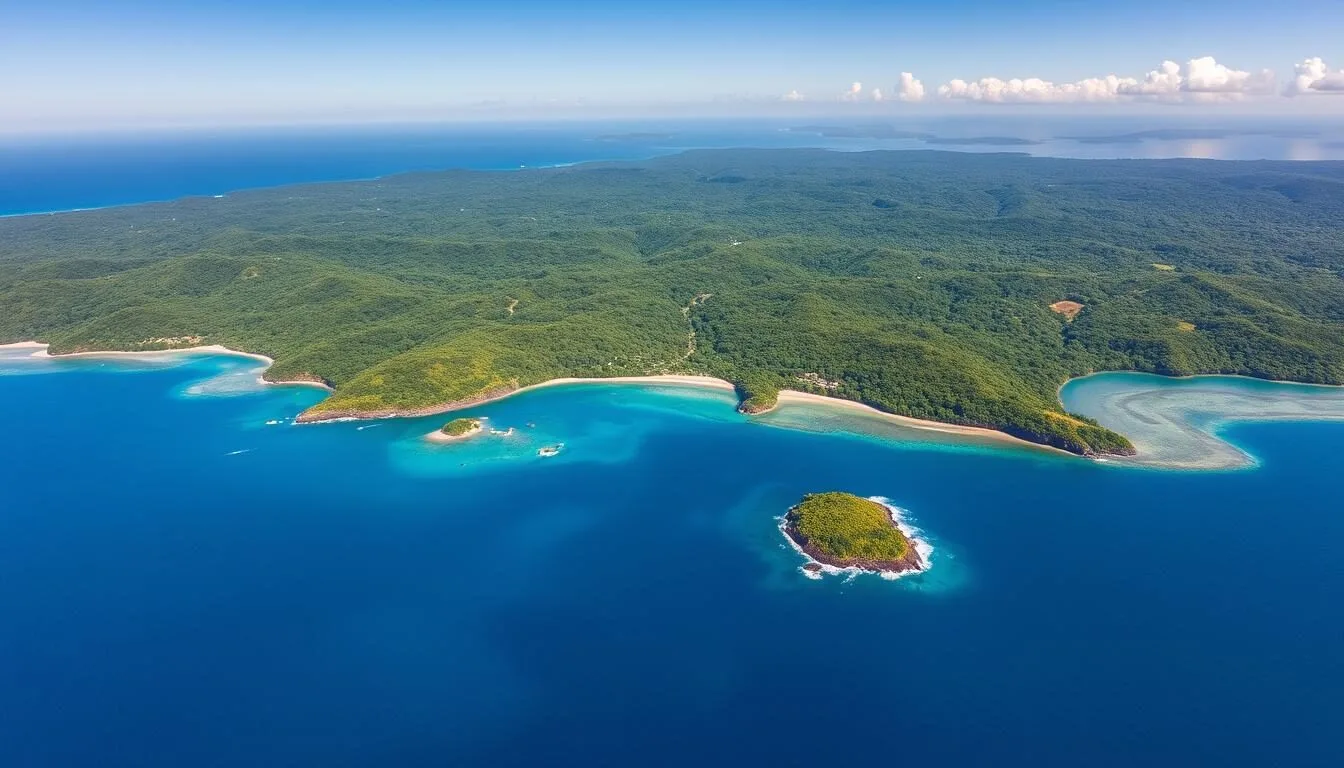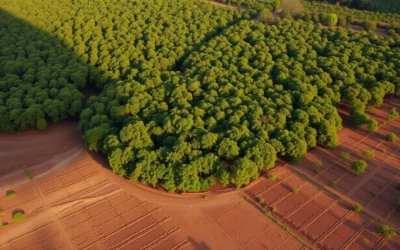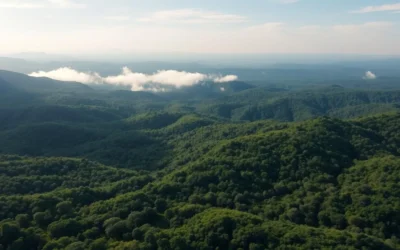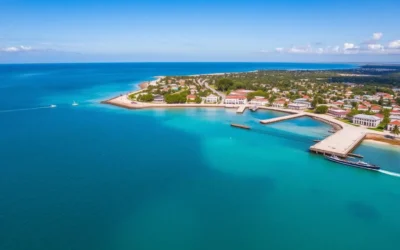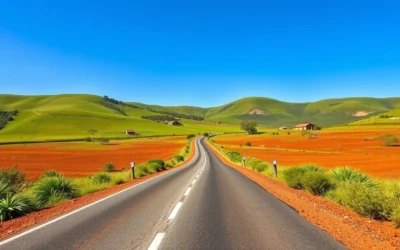Home to 13 species of lemurs found nowhere else on Earth, Mananara-Nord National Park shelters more endemic wildlife per square kilometer than many of the world’s most famous rainforests. This UNESCO Biosphere Reserve represents Madagascar’s astonishing biodiversity at its finest, with its pristine combination of tropical rainforest and marine ecosystems creating a paradise for nature enthusiasts.
Established in 1989 as Madagascar’s first Biosphere Reserve, this 23,000-hectare terrestrial park and 1,000-hectare marine sanctuary offers visitors a rare glimpse into one of the planet’s most unique ecosystems. From the dark-furred indri lemurs echoing their haunting calls through ancient forests to vibrant coral reefs teeming with endemic marine life, Mananara-Nord delivers unforgettable experiences for those willing to venture off the beaten path.
Getting There & Planning Your Journey
The stunning meeting point of rainforest and ocean at Mananara-Nord National Park
Reaching Mananara-Nord requires some planning, but the journey is well worth the effort. The park is located 280 km north of Toamasina (formerly Tamatave) in the Analanjirofo region of eastern Madagascar.
By Road
From Antananarivo, take RN2 to Toamasina, then continue on RN5 toward Mananara. The road is paved from Toamasina to Soanierana Ivongo but becomes a challenging secondary road afterward. The total journey from the capital typically takes two to three days, with an overnight stop recommended.
Find the Best Transportation Options
Compare prices and book your flights to Madagascar in advance for the best deals.
By Public Transport
Take a taxi-brousse (shared minibus) from Antananarivo’s Ambodivona station to Toamasina, then transfer to another from Toamasina’s Tanambao V station to Mananara. While affordable, this option requires patience as schedules can be unpredictable.
By Boat
For a more scenic approach, boat services operate from Soanierana Ivongo or Sainte Marie island to Mananara (approximately 5 hours). From Mananara town, it’s another 1-1.5 hours by speedboat to the park entrance. The sea is calmest from April to October.
Mananara-Nord National Park location in northeastern Madagascar
Best Time to Visit & Weather Tips
Mananara-Nord experiences a humid tropical climate with an average temperature of 25.2°C (77.4°F). The region receives significant rainfall, up to 2,900 mm annually, and humidity remains high year-round.
Recommended Months (April-October)
- Drier weather with fewer rain showers
- Calmer seas for boat trips to the marine park
- Better conditions for hiking forest trails
- Peak wildlife viewing opportunities
- More comfortable temperatures
Months to Avoid (January-March)
- Cyclone season with heavy rainfall
- Difficult road conditions
- Rough seas limiting marine park access
- Muddy and slippery forest trails
- Some areas may become inaccessible
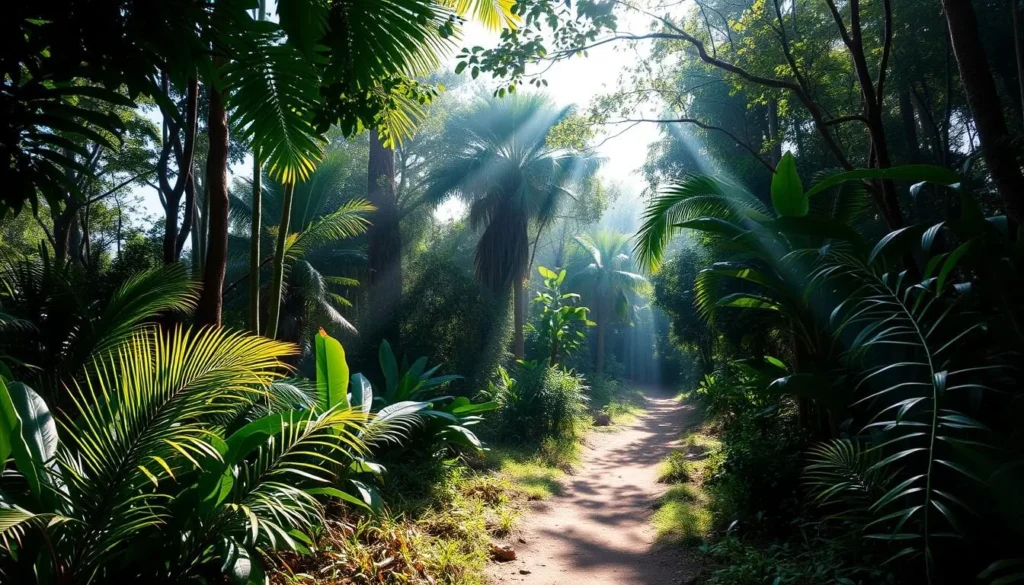
Forest trails are more accessible during the drier months from April to October
Weather Tip: Even during the drier season, prepare for sudden rain showers and significant temperature differences between sunny areas and the dense forest interior. Pack lightweight, quick-drying clothing and a good rain jacket regardless of when you visit.
Getting Around Locally
Once you’ve reached Mananara town or Antanambe village (the two main access points), you’ll need to arrange transportation to and within the park.
Park Transportation
- Guided Hikes: All park visits require a guide. The established circuits range from half-day excursions to multi-day treks.
- Boat Trips: To visit the marine portion (Nosy Antafana), you’ll need to hire a boat from either Mananara or Antanambe. Speedboats take 45-90 minutes depending on your starting point.
- Porters: For longer treks, porters are available to carry equipment and supplies at a rate of approximately 12,000-15,000 Ariary per day.
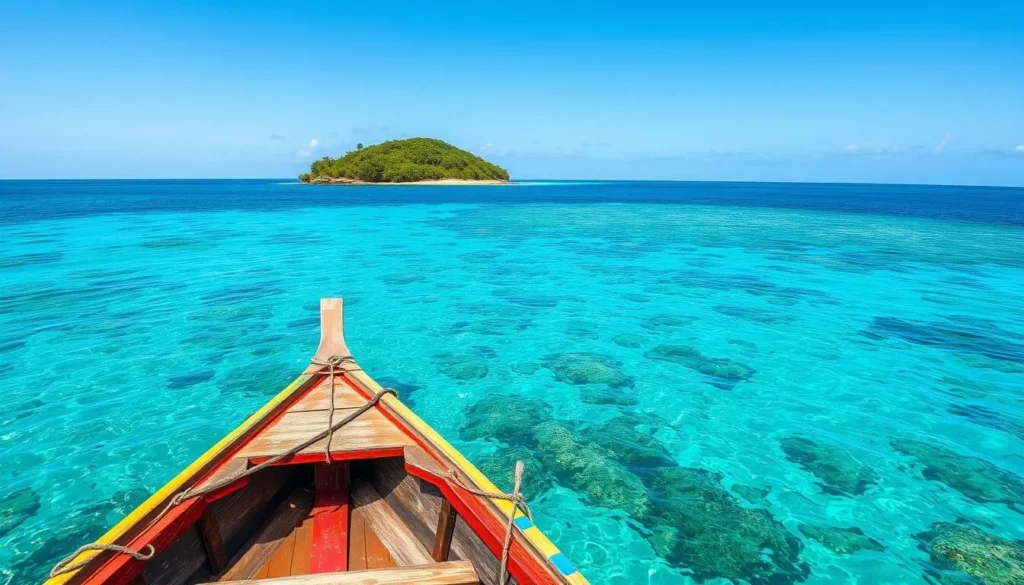
Boat transportation to Nosy Antafana in the marine section of the park
Explore Mananara-Nord With Expert Guides
Book guided tours with knowledgeable local experts who can enhance your experience with insights about the park’s unique biodiversity.
Where to Stay
Accommodation options around Mananara-Nord National Park are limited but provide authentic experiences close to nature. Advance booking is highly recommended, especially during peak season.
Ecotourism Lodge of Nosy Antafana
Basic but comfortable accommodation on the island itself, offering a unique opportunity to stay within the marine park. The lodge operates on a bed & breakfast basis and provides an immersive experience with direct access to beaches and coral reefs.
Best for: Marine enthusiasts and those seeking an island experience
Community Lodge Antanambao-Mandrisy
Run by a local women’s organization in collaboration with Madagascar National Parks, this seaside lodge features bungalows, family rooms, and a restaurant. Located just 1.7 km from the village, it offers easy access to mangroves and beaches.
Best for: Cultural immersion and supporting local communities
Sahasoa Community Lodge
Another community-managed accommodation option located 1 km from Sahasoa village. Features bungalows, family rooms, and a restaurant with information boards about local tours and activities.
Best for: Families and those interested in Betsimisaraka culture
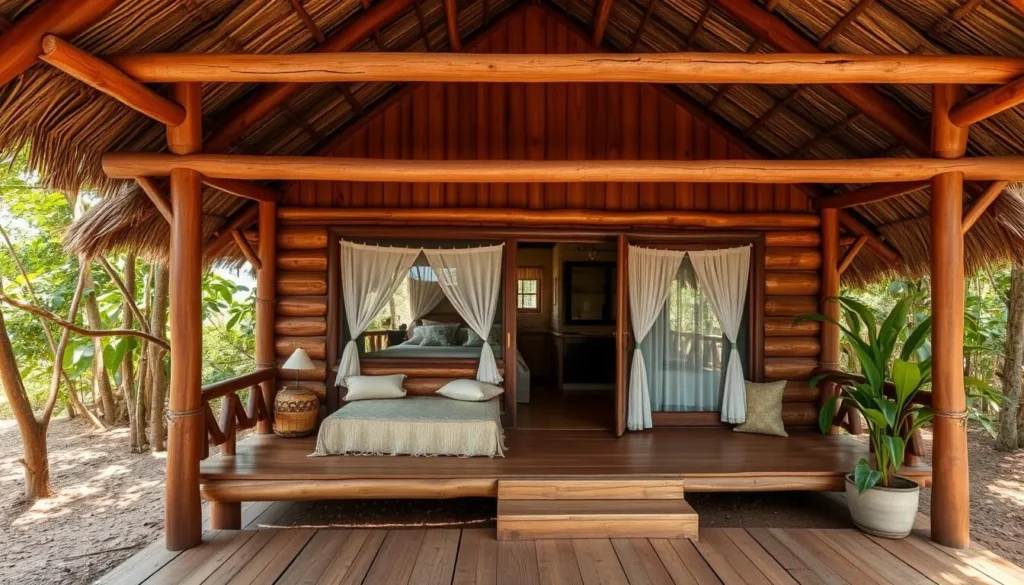
Eco-friendly accommodation options blend harmoniously with the natural environment
Find Your Perfect Stay
Book your accommodation in advance to secure the best options near Mananara-Nord National Park.
Camping Option: Camping is permitted on Nosy Antafana for those seeking a more adventurous experience. Bring your own equipment and make arrangements through the park office.
Dining & Local Cuisine
The Mananara region offers simple but delicious cuisine heavily influenced by its coastal location and agricultural heritage. Most meals are prepared at lodges or in local villages.
Local Specialties
- Coconut-based dishes: The region is known for its creative use of coconut in various preparations, including octopus with coconut, coconut fish, and coconut cassava leaves.
- Sahoaba: A sweet treat made from bananas and coconut.
- Seafood: Fresh catches from the Indian Ocean feature prominently in local cuisine.
- Tropical fruits: Abundant local fruits include coconut, banana, breadfruit, lychees, and jackfruit.
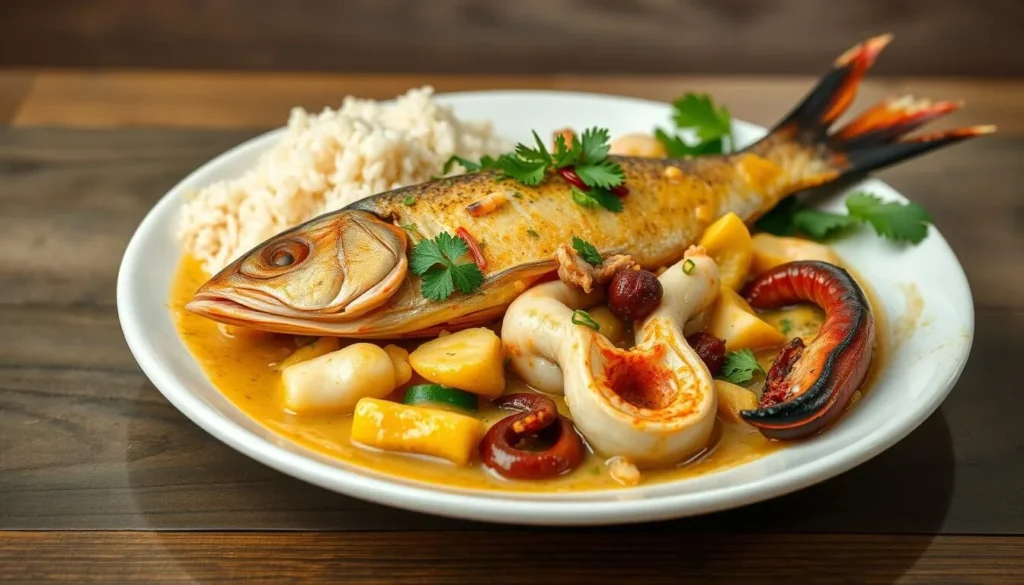
Fresh seafood with coconut sauce, a local specialty in the Mananara region
“The cuisine of Mananara blends the bounty of the sea with the richness of the land, creating flavors that are distinctly Malagasy yet unique to this fertile coastal region.”
Dining Tips
- Most meals will be arranged through your accommodation or tour provider.
- Village markets operate on Tuesdays and Thursdays (traditional non-farming days).
- The market is especially vibrant during vanilla season (June-September).
- Bring some snacks and water for longer treks in the park.
Attractions, Sightseeing & Activities
Mananara-Nord National Park offers a diverse range of attractions across both its terrestrial and marine sections. The park is divided into several circuits (tours) of varying difficulty and duration.
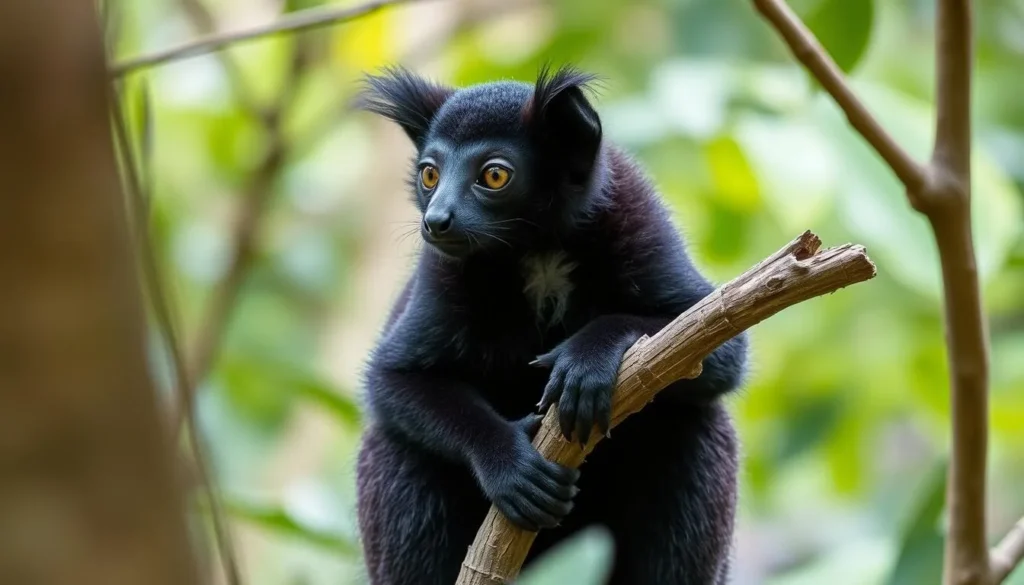
The park’s Indri lemurs have darker fur than those found in other regions of Madagascar
Top Circuits in the Park
Verezanantsoro Circuit
Difficulty: Medium
Distance: 20 km
Duration: Full day
This popular trail takes you through clove and vanilla plantations along the coast before diving into the heart of the low-altitude rainforest. Highlights include spotting Indri and Black-and-white ruffed lemurs, various bird species, and enjoying panoramic views.
Nosy Antafana Circuit
Difficulty: Easy
Distance: 16 km (including boat journey)
Duration: Half day
Visit Madagascar’s first marine protected area, featuring stunning coral reefs, mangrove forests, and pristine beaches. The island is home to flying foxes (fruit bats), seabirds, and diverse marine life. Best visited between October and April when seas are calmer.
Ivontaka Sud Circuit
Difficulty: Difficult
Distance: 16 km
Duration: Full day
This challenging trail from Sahasoa village features steep slopes and dramatic climate changes. You’ll trek through agricultural lands and dense forest to spot lemurs (including Indri), endemic plants, orchids, and birds like the Helmet vanga and Madagascar crested ibis.
Additional Activities
- Varary Circuit: A challenging two-day trek offering the best panoramic views of the park.
- Snorkeling and Diving: Explore the vibrant coral reefs around Nosy Antafana.
- Birdwatching: The park hosts 77 bird species, including many endemics.
- Night Walks: Spot nocturnal species like the Aye-aye and various chameleons.
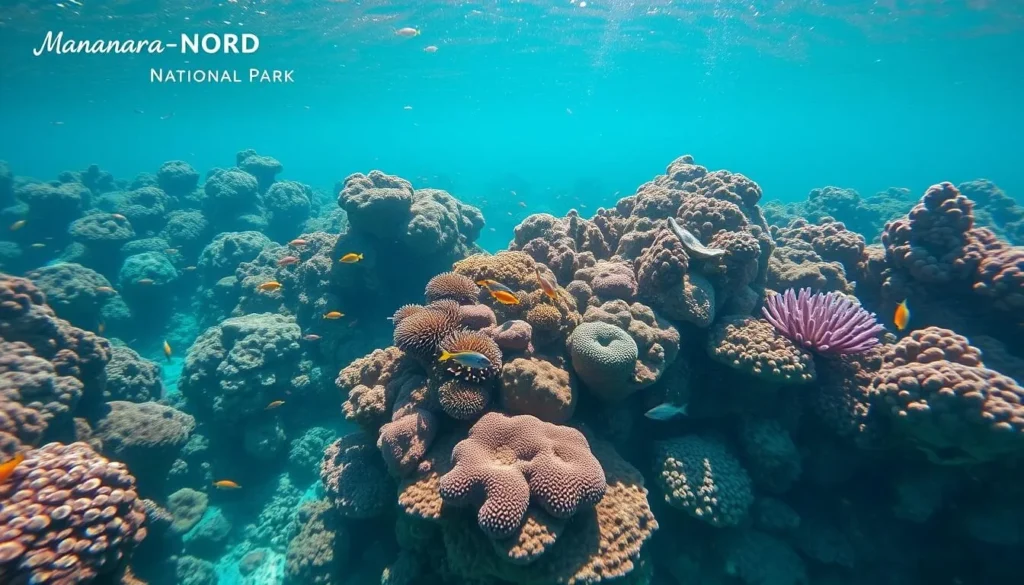
The marine section of the park offers excellent snorkeling opportunities
Remarkable Wildlife Encounters
Mananara-Nord National Park boasts exceptional biodiversity, making it a paradise for wildlife enthusiasts. The park’s isolation has helped preserve many species found nowhere else on Earth.
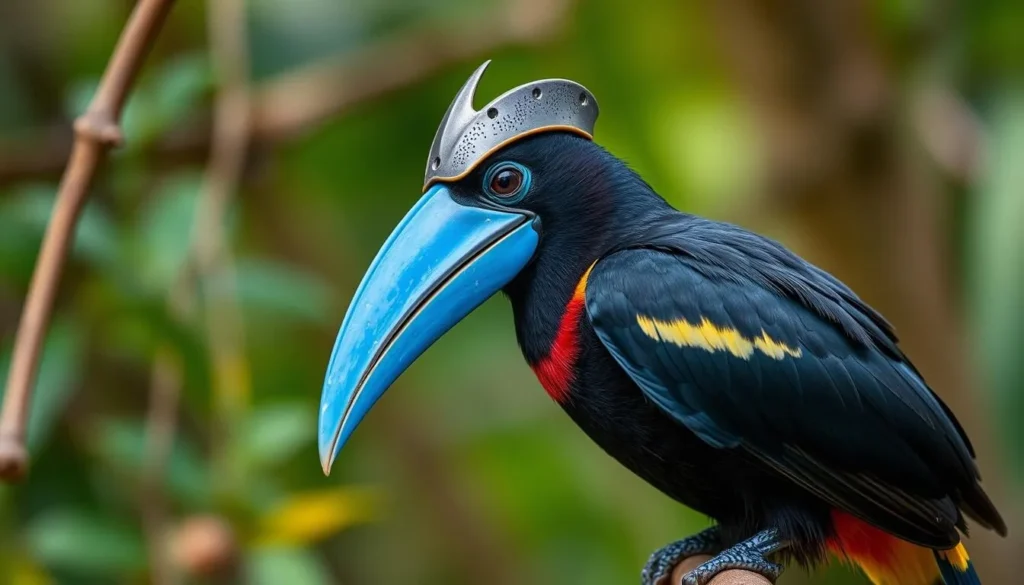
The Helmet vanga, an indicator species of undisturbed forest in Mananara-Nord
Lemurs
The park is home to 13 lemur species, including:
- Indri (Babakoto): The largest lemur species, with a distinctive dark coat in this region.
- Black-and-white ruffed lemur (Varikandana): Easily observed in the Verezanantsoro Circuit.
- Aye-aye (Haihay): One of the world’s most unusual primates, with an elongated middle finger for extracting insects.
- Hairy-eared dwarf lemur (Tsidiala): An extremely rare species found exclusively along the Mananara River.
Birds
Birdwatchers can spot 77 species, including:
- Helmet vanga: With its massive blue bill, this species indicates pristine forest conditions.
- Madagascar crested ibis: A rare endemic species.
- Scaly ground-roller: A ground-dwelling bird difficult to spot elsewhere.
- Madagascar blue pigeon: A colorful forest dweller.
Marine Life
The marine park section features:
- 179 fish species
- 132 species of coral
- Madagascar anemonefish, an indicator of intact marine habitat
- Sea turtles, including loggerhead and hawksbill species
Experience Madagascar’s Unique Wildlife
Join specialized wildlife tours with expert guides who can help you spot these remarkable species.
Cultural Experiences & Local Traditions
The communities surrounding Mananara-Nord National Park offer rich cultural experiences that complement the natural attractions. The majority of the population belongs to the Betsimisaraka ethnic group, with significant Tsimihety and mixed Chinese-Malagasy communities.

Mananara is one of Madagascar’s premier vanilla-producing regions
Cultural Highlights
- Tsaboraha: A traditional ceremony that strengthens community bonds, featuring the sacrifice of a zebu, traditional music, and the sharing of betsabetsa (traditional rum).
- Rasariagna: A ritual performed by the Betsimisaraka to honor ancestors, always taking place on Saturdays.
- Local Legends: Stories about Rangontsy (for whom the second island is named), the origin of Sahasoa village, and tales of the Zafindrainibanda (descendants of pirates).
Community Tours
Several community-based tourism initiatives offer authentic cultural experiences:
- Antanambao Mandrisy Village Tour: Explore mangroves, coastal forests, and learn about agro-ecological practices and Betsimisaraka culture.
- Sahasoa Community Tour: Visit historic caves and experience local traditions.
- Andavakandrehy Tour: Discover ancient tombs, historic caves, and traditional agricultural practices.
Agricultural Heritage
The region is renowned for its production of:
- Cloves: Mananara is Madagascar’s largest producer of this valuable spice.
- Vanilla: The leading producer in the Toamasina province.
- Coffee: A significant crop in the region’s economy.
Practical Travel Tips
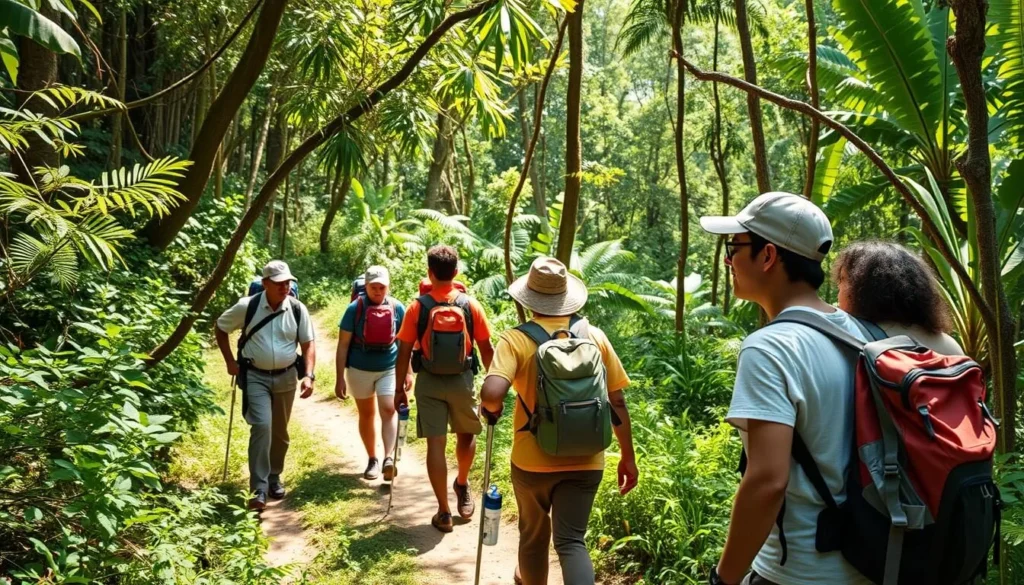
Guided hikes are mandatory and enhance your understanding of the park’s ecosystems
Park Information
- Park Offices: Located in Antanambe and Mananara (Mahambolona).
- Entrance Fees: Approximately 45,000 Ariary per day for foreign adults, 25,000 Ariary for children.
- Guides: Mandatory for all park visits, costing around 30,000 Ariary per day depending on the circuit.
- Porters: Available for 12,000-15,000 Ariary per day, including meals and accommodation.
What to Pack
- Lightweight, quick-drying clothing
- Good hiking shoes with traction for muddy trails
- Rain jacket or poncho (even in the dry season)
- Insect repellent and sunscreen
- Basic first aid supplies
- Snorkeling gear if planning to visit the marine park
- Flashlight for night walks or power outages
Local Customs & Taboos (Fady)
- Tuesdays and Thursdays are traditional non-working days for agriculture
- Show respect to elders (olombe)
- Some food taboos exist, including goat meat and hornless beef (omby bory)
- Ask permission before photographing people or sacred sites
Health & Safety: Bring necessary medications as pharmacies are limited in the area. Consider malaria prophylaxis and ensure your routine vaccinations are up to date. The nearest hospital facilities are basic, so comprehensive travel insurance is essential.
Experience the Magic of Mananara-Nord
Mananara-Nord National Park represents Madagascar at its most authentic and untouched. From the haunting calls of indri lemurs echoing through primeval forests to the kaleidoscope of colors beneath the waves at Nosy Antafana, this UNESCO Biosphere Reserve offers experiences that will remain with you long after you’ve returned home.
While reaching this remote paradise requires effort, those who make the journey are rewarded with uncrowded trails, genuine cultural encounters, and wildlife sightings that few travelers ever experience. As one of Madagascar’s best-kept secrets, Mananara-Nord invites you to discover a world where nature still reigns supreme and biodiversity flourishes in magnificent abundance.
Ready to hear the indri’s dawn chorus echo through ancient forests? Your adventure to one of Earth’s most extraordinary ecosystems begins now.
Plan Your Mananara-Nord Adventure Today
Start your journey to this remarkable UNESCO Biosphere Reserve with these essential travel services.
The above is subject to change.
Check back often to TRAVEL.COM for the latest travel tips and deals.
